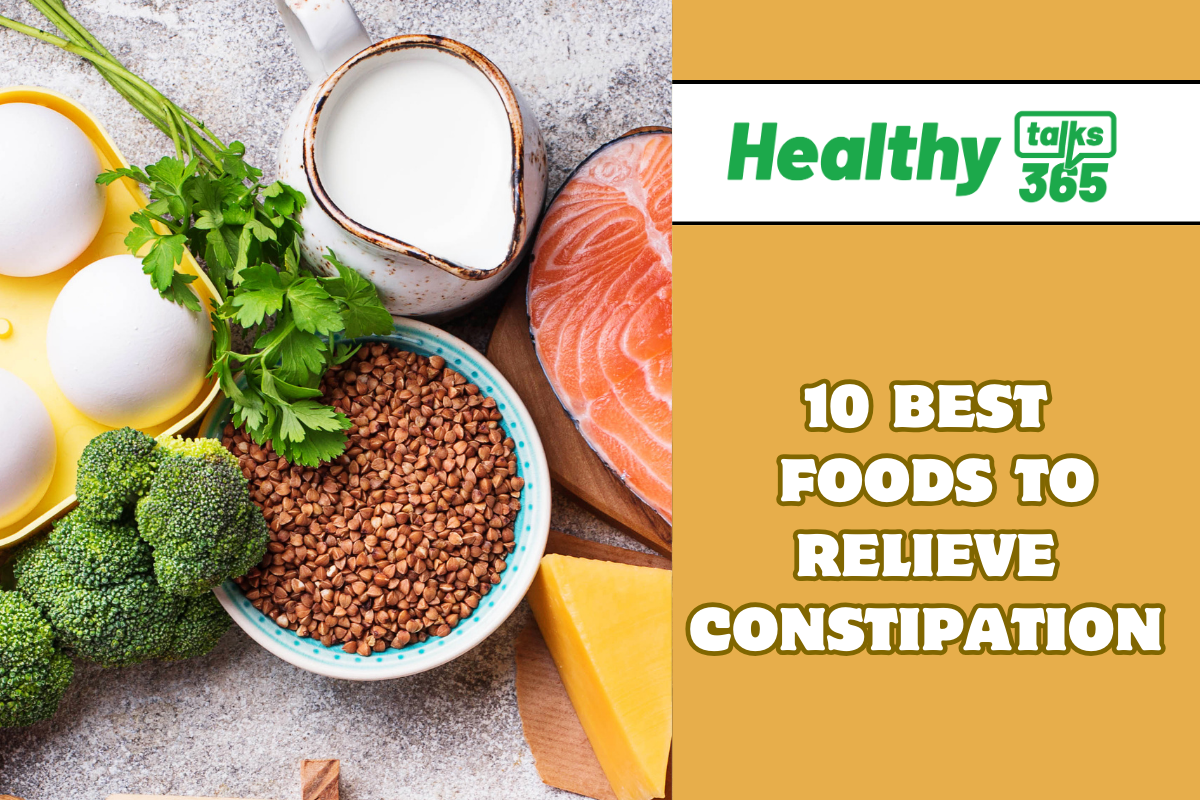10 BEST FOODS TO RELIEVE CONSTIPATION
1. Prunes help in relieving constipation
Prunes are renowned for their natural laxative properties and are commonly used to relieve constipation. They are rich in fiber, particularly insoluble fiber, which adds bulk to stool and promotes regular bowel movements. Additionally, prunes contain sorbitol, a sugar alcohol that acts as an osmotic laxative, drawing water into the intestines and softening stool, making it easier to pass.
Furthermore, prunes contain natural compounds called phenolic compounds, which may help stimulate intestinal contractions and aid in bowel movements. Consuming prunes or prune juice regularly can be an effective and gentle way to alleviate constipation and promote digestive health.

2. Apples reduce constipation
Apples are known for their high fiber content, making them a popular choice for relieving constipation. The fiber found in apples, both soluble and insoluble, helps add bulk to stool and promotes regular bowel movements.
Apples contain a type of soluble fiber called pectin, which acts as a prebiotic, feeding beneficial bacteria in the gut and promoting digestive health. Furthermore, apples contain sorbitol, a natural sugar alcohol that has a mild laxative effect by drawing water into the intestines and softening stool.
Read Also:
3. Pears are effective in relieving constipation
Pears are often praised for their natural ability to relieve constipation due to their high fiber content and unique combination of soluble and insoluble fiber. The insoluble fiber in pears adds bulk to stool, helping to facilitate bowel movements and alleviate constipation.
Meanwhile, the soluble fiber found in pears, such as pectin, acts as a prebiotic, nourishing beneficial gut bacteria and promoting overall digestive health. Additionally, pears contain sorbitol, a natural sugar alcohol with a mild laxative effect that helps soften stool and stimulate bowel movements by drawing water into the intestines.
4. Kiwi helps in easy digestion
Kiwi is widely recognized for its digestive benefits, thanks to its rich fiber content and unique enzymes. Kiwi contains both soluble and insoluble fiber, which aid in promoting regular bowel movements and preventing constipation. Additionally, kiwi contains an enzyme called actinidin, which is known for its protein-digesting properties.
This enzyme helps break down proteins in the digestive tract, facilitating smoother digestion and potentially reducing symptoms such as bloating and discomfort. Moreover, the combination of fiber and enzymes in kiwi can help support a healthy balance of gut bacteria, promoting overall digestive health.
5. Berries relieve constipation
Berries, such as strawberries, blueberries, raspberries, and blackberries, are rich in dietary fiber and natural compounds that can help relieve constipation. The high fiber content in berries, including both soluble and insoluble fiber, adds bulk to stool and promotes regular bowel movements, aiding in the prevention and alleviation of constipation.
Additionally, berries contain natural sugars and polyphenols, which can have a mild laxative effect by drawing water into the intestines and softening stool, making it easier to pass. Furthermore, berries are rich in antioxidants and vitamins that support overall digestive health and may help reduce inflammation in the gastrointestinal tract.

Read Also:
Focus While Studying: 10 Proven Methods
6. Prune juice reduces constipation
Prune juice is renowned for its effectiveness in reducing constipation due to its high fiber and sorbitol content. Prunes are naturally rich in fiber, including both soluble and insoluble fiber, which adds bulk to stool and promotes regular bowel movements. Additionally, prune juice contains sorbitol, a natural sugar alcohol with a mild laxative effect.
Sorbitol draws water into the intestines, softening stool and stimulating bowel movements, making it easier to pass. Furthermore, prune juice is a concentrated source of natural compounds called phenolic compounds, which may help stimulate intestinal contractions and aid in bowel movements.
7. Beans helps relieve constipation
Beans are a beneficial addition to the diet for alleviating constipation due to their high fiber content and unique combination of soluble and insoluble fiber. Soluble fiber found in beans absorbs water in the digestive tract, forming a gel-like substance that softens stool and promotes regular bowel movements.
Insoluble fiber adds bulk to stool, aiding in the passage of waste through the digestive system and preventing constipation. Additionally, beans contain resistant starch, which acts as a prebiotic, feeding beneficial gut bacteria and promoting a healthy balance of gut flora. Moreover, beans are rich in nutrients such as magnesium, which plays a role in muscle relaxation and bowel function.
8. Whole grains play an important role in bowel regularity
Whole grains are essential for promoting bowel regularity due to their high fiber content and nutrient-rich composition. The fiber found in whole grains, including both soluble and insoluble fiber, adds bulk to stool and promotes healthy bowel movements. Soluble fiber forms a gel-like substance in the digestive tract, which helps soften stool and makes it easier to pass. Insoluble fiber adds bulk to stool, aiding in the movement of waste through the digestive system and preventing constipation.
Additionally, whole grains contain various vitamins, minerals, and antioxidants that support overall digestive health and function. Consuming a variety of whole grains regularly, such as oats, brown rice, quinoa, and whole wheat, can contribute to improved bowel regularity and digestive comfort.
9. Leafy vegetables help in constipation
Leafy vegetables are beneficial for relieving constipation due to their high fiber content and water content. Fiber is essential for promoting bowel regularity, and leafy greens such as spinach, kale, and Swiss chard are rich sources of both soluble and insoluble fiber.
Soluble fiber forms a gel-like substance in the digestive tract, which helps soften stool and makes it easier to pass. Insoluble fiber adds bulk to stool, aiding in the movement of waste through the digestive system and preventing constipation. Additionally, leafy vegetables have a high water content, which adds moisture to stool and helps facilitate its passage through the intestines.

Read Also:
Healthy Foods For Keeping Healthy Weight In Winters Cold
10. Flax seeds provide relief in constipation
Flax seeds are well-known for their ability to provide relief from constipation due to their high fiber content and unique composition. They are rich in soluble and insoluble fiber, with soluble fiber forming a gel-like substance when mixed with water, which softens stool and promotes bowel movements. Insoluble fiber adds bulk to stool, helping it move more efficiently through the digestive tract and preventing constipation.
Fax seeds contain a mucilage component that acts as a natural lubricant in the intestines, further aiding in the passage of stool. Furthermore, flax seeds are a source of omega-3 fatty acids, which have anti-inflammatory properties that may help alleviate digestive discomfort associated with constipation.




